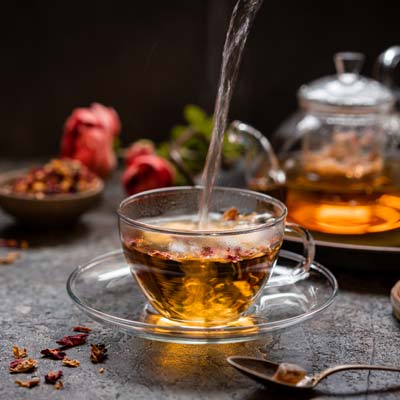Health Benefits of Herbal Tea

Herbs are one of the easiest (and cost effective) ways to promote health as they hold a number of different healing properties. They also can be included in your diet in a number of ways and are relatively easy to find. Herbs have successfully been used for years as healing properties and solutions to chronic health issues.
In fact, some of these herbs have worked so well that they are still found to be used even today. In this week’s blog we are going to discuss seven different herbal teas, their potential health benefits, and why you should consider including them in your diet.
#1. Green Tea
Green tea is one of the best teas to drink because it is so high in antioxidant factors. This makes it beneficial in many aspects of health, including improving cognitive function, weight management, as well as protection against cancer and heart disease. Green tea is one of the most common forms of tea. It can be found nearly at any food store and all of them provide essentially the same benefits. You can even find a decaf version. Drinking a cup of green tea a day, whether hot or cold, will certainly give your health a boost.
#2. Ginger Tea
Ginger tea is another common type of herbal tea that is found to have many benefits. In fact, some of its main benefits surround relief from morning sickness and motion sickness. Whether you are ingesting it through tea or capsule, ginger brings a number of different benefits that can help bring you relief from these common illnesses and symptoms.
#3. Rose Hips
Rose hips tea is another tea that is rich in antioxidants. It is actually one of the teas that is highest in antioxidants, above green tea. That being said, it has a number of different health benefits alongside it. One of them being a big immune system boost. This is due to the high concentration of vitamin C found in the plant. As we know, vitamin C has one of the biggest influences in our health when it comes to getting sick, therefore this is one of the best teas to consume when you enter flu season or feel like you are coming down with a cold.
#4. Chamomile Tea
Chamomile tea is a commonly heard of tea, especially when it comes to sleeping. We all know chamomile tea as one that is used for relaxation and sleep, and this is exactly what it is known for scientifically. Relaxation and sleep is chamomile’s trademark seller due to its mild sedative effect. It is known to not only induce sleep, but helps improve the quality of sleep. Whether you are having difficulty falling asleep or staying asleep, chamomile tea may potentially be your solution.
#5. Sage
Sage tea is not a commonly heard of tea alongside the others, but it is still one that has amazing benefits. These benefits include healthy skin, promoting wound healing, oral health, antioxidants, anti cancer properties, and more. It is also known to help manage Type 2 Diabetes as it is beneficial in blood sugar control. With all of these benefits in mind, you can either drink this herb within a tea or you can find it and use it as a regular cooking herb. Either way you are going to get the same health benefits.
#6. Peppermint
Peppermint tea is just what is sound like. A tea that has a minty fresh taste and has a number of health benefits. One of the biggest health benefits being the improvement of digestive issues. Peppermint tea is one of the easiest ways to get relief from bloating, gas, and indigestion. It is also a tea that is great in taste and leaves you feeling fresh after hours of drinking it.
#7. Nettle
Nettle tea is another type of tea that is not commonly known but still holds a number of health benefits. These benefits include reducing and treating muscle pain, eczema, arthritis, gout, anemia, and even urinary tract infections. This kind of herb is big in anti-inflammatory properties, making it beneficial with nearly any type of pain or joint discomfort.
With all of this in mind, these herbal teas collectively have a number of amazing health benefits, however, they are over the counter supplements. Over the counter supplements can be a perfect way to help promote health, but they do also come with some warning as they can be interactive with certain prescription medications and/or pregnancy. This being said, if you decide to start taking herbal supplements, including teas, be sure to consult a health care provider to insure that your herbal choices do not interact with any medications that you could be taking. If you are pregnant or trying to get pregnant, talk to your doctor first about any herbs or supplements you may be taking.
